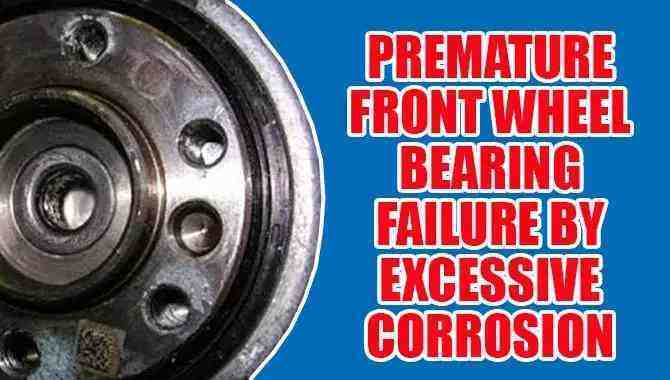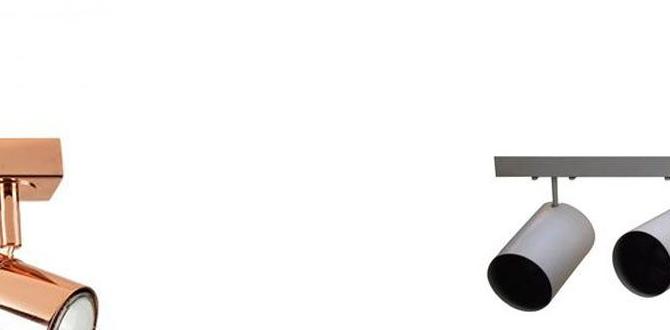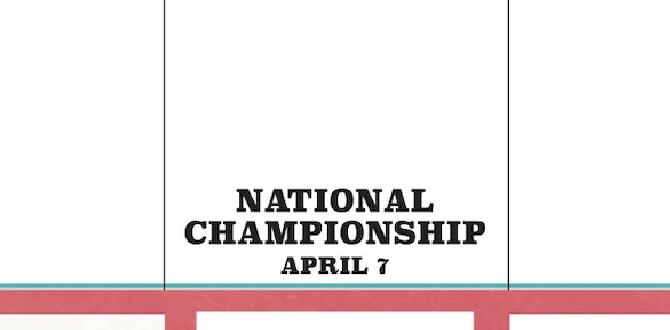A wheel bearing is a crucial component of a vehicle’s suspension system. It allows the wheels to rotate smoothly and with minimal friction, which helps to ensure a safe and comfortable ride.
Over time, wheel bearings can wear down due to factors such as normal wear and tear or exposure to harsh driving conditions. When it comes to your car, you never want anything to go wrong. And that includes the bearings that keep your wheels turning correctly.
But what is premature front wheel bearing failure, and how can corrosion cause it? This blog post will share everything you need to know about this common car problem and how to fix it.
By understanding the causes of premature front wheel bearing failure, you can avoid it from happening in the first place. So read on to learn how to fix premature front wheel bearing failure by excessive corrosion.

What Is A Front Wheel Bearing?
A front wheel bearing is part of a vehicle’s suspension and steering system. It is a set of ball bearings that allow the wheel to rotate freely and without friction. The bearing is held in place by a metal or plastic housing attached to the wheel hub assembly.
The wheel hub assembly is a part of the vehicle’s suspension system and helps to absorb shock from the road while allowing the wheel to rotate. The front wheel bearing is critical for proper vehicle operation and needs to be inspected regularly to ensure it is in good condition.
Front-wheel bearings are one of the most crucial parts of a motorcycle. If they fail, it can cause the bike to stop in traffic or even lead to a crash. So, it’s essential to know what causes this failure and take appropriate measures to prevent it. One main culprit is excessive corrosion, which can form on the component due to moisture, salt, and other contaminants.
What To Look For
Premature front wheel bearing failure can be frustrating and costly for drivers. Fortunately, there are some signs to look out for that can help you identify the problem before it becomes too serious.
One of the most common symptoms of a failing front wheel bearing is a loud grinding or humming noise from the wheels. Taking corrective action is vital if you’re experiencing bearing failure on your bike. Here are four things you can look for that will help you determine the cause:
- Excessive corrosion on the front wheel bearing is a common cause of bearing failure, and one should fix it immediately.
- If any signs of rust or corrosion are present, bearings may be in an acidic environment. And you should clean and lubricate it before they fail again.
- Checking for misalignment – By inspecting the axle alignment, you can detect if placing any undue stress on one or more bearings; if so, you need to take corrective action immediately.
- Bearing wear happens to excessive loads or improper lubrication. In most cases, bearing failure results from either overloaded bearings or inadequate lubrication levels, requiring immediate attention to prevent further damage and premature failure.
- You can take several steps to fix the issue before it becomes severe. If you find that corrosion is the root of your bearing failure, be proactive and take the necessary steps to prevent it from happening again.
5 Easy Steps To Fix Premature Front Wheel Bearing Failure
Bike enthusiasts everywhere know the pain of a premature front wheel bearing failure. This is the failure of the bearing that sits at the front of the wheel, which can be incredibly frustrating. Not only is it expensive to fix, but it can also be dangerous if not repaired promptly.
If you’re ever worried about your bearing’s failure, keep an eye out for signals that it’s in trouble. Make necessary repairs as soon as possible, and depending on the severity of the corrosion, you may be able to replace one or both bearings without any other maintenance necessary.
Experiencing premature front wheel bearing failure can be frustrating and potentially dangerous, but there are some steps you can take to fix the issue. Here are 5 steps to fix premature front wheel bearing failure:
- Proper installation: Ensure the bearing is installed correctly and with the proper torque specifications to prevent premature wear.
- Regular maintenance: Regularly inspect and service your vehicle’s wheel bearings to catch any issues early on and prevent further damage.
- Upgrade to high-quality bearings: Consider upgrading to high-quality aftermarket bearings that may have longer lifespans than standard factory bearings.
- Address alignment issues: If your vehicle has alignment issues, it can cause uneven wear on the bearings. Be sure to address any alignment problems as soon as possible.
- Avoid harsh driving conditions: Harsh driving conditions, such as off-roading or driving on rough terrain, can put extra stress on the wheel bearings. Avoid these conditions if possible, or take precautions such as using reinforced bearings designed for rugged use.
Signs And Symptoms Of Corrosion
Corrosion is a gradual and insidious process that can kill parts of your bike prematurely. Keep your bike clean and free from moisture to prevent it from happening. In the unfortunate event that corrosion occurs, take action immediately by repairing the damage done.
Look out for signs and symptoms of corrosion, such as excessive rust, pitting, or bulging – if you see any of these indicators, it’s time to get help restoring your beloved ride to its former glory.
Corrosion is a process that can cause damage to metal parts. A lack of lubrication can cause it, and you can prevent this with regular maintenance. Signs of corrosion include noise, poor performance, and unexpected failure.
For mild cases of corrosion, your mechanic or garage may be able to fix it without much trouble. However, if the corrosion is more severe or widespread, you might need to get it fixed by a professional technician.
Treating Rust And Corrosion
Rust and corrosion are two common problems that can affect your bearings. If left unchecked, they can cause premature failure of the bearing unit, leading to reduced efficiency and performance. Here are some tips on how to keep your bearings running smoothly for years to come:
- Use sealants and lubricants designed explicitly for bearing use.
- Check the condition of your bearings regularly; if necessary, take corrective measures such as replacement or repair.
- Remove rust and corrosion using suitable techniques – this will help maintain bearing reliability in the long run.
Preventing Corrosion In Your Bike
Keeping your bike clean and dry is the best way to prevent corrosion. Not only will this help keep it looking good, but it will also protect the metal parts from damage. Corroding metal can cause premature front wheel bearing failure, so make sure you regularly lubricate to avoid problems.
And if you notice any signs of corrosion, don’t hesitate to get it checked out by a professional. One of the leading causes of premature front wheel bearing failure in bikes is corrosion. Corrosion can cause the bearings to wear out quickly, leading to a loss of control while riding. To prevent corrosion in your bike, there are a few steps you can take:
- Keep your bike clean and dry: After riding in wet or muddy conditions, be sure to clean and dry your bike thoroughly.
- Lubricate the bearings regularly: Use a high-quality lubricant to keep the bearings well-oiled and protected from moisture.
- Avoid exposure to salt water or harsh chemicals: Saltwater and certain chemicals can accelerate corrosion, so avoid exposing your bike to these substances whenever possible.
These steps help prevent premature front wheel bearing failure and ensure your bike stays safe and reliable for years.
How Can You Identify If Your Bike Is Prone To Premature Front Wheel Bearing Failure?
Identifying if your bike is prone to premature front wheel bearing failure can prevent potential accidents and costly repairs. Some signs that your bike may be at risk include a wobbling sensation in the front wheel, unusual noises while riding or turning, and difficulty steering.
Additionally, if you notice any unusual wear on the front tire or brake pads, it may indicate front wheel bearing issues. Regular maintenance and inspection of your bike’s bearings can help prevent premature failure and ensure your riding safety.
If you suspect your bike may be at risk for front wheel bearing failure, it is important to have it inspected by a professional mechanic as soon as possible.
Repair/Replace A Prematurely Failed Front Wheel Bearing
If your front wheel bearing has failed prematurely, it’s important to address the issue immediately to prevent further damage to your vehicle. It’s important to note that if you’re uncomfortable with DIY car repairs, it’s best to leave this job to a professional mechanic with experience handling wheel bearings. Here are the steps you can follow to repair or replace a failed front wheel bearing:
- Diagnose the problem: Before starting any repairs, you must confirm that the wheel bearing is the culprit. You can do this by listening for unusual noises while driving, jacking up the affected wheel, and checking for play in the hub.
- Remove the wheel: Once you’ve confirmed that the wheel bearing is the issue, remove the tire and brake assembly to access the hub.
- Remove and replace the damaged bearing: Depending on your vehicle, you may need specialized tools to remove and replace the damaged bearing. Follow manufacturer instructions carefully.
- Reassemble: Once you have replaced the bearing, reassemble everything in reverse order of disassembly.
- Test drive: Take your vehicle for a test drive to ensure that everything is functioning properly.
Adequately Lubricating To Avoid Premature Front Wheel Bearing Failure
Keeping your bike properly lubricated is essential to avoiding premature front wheel bearing failure. Front-wheel bearings are an important part of your bike’s suspension system, allowing it to roll smoothly and efficiently.
Without proper lubrication, these bearings can wear out quickly, leading to many problems, including noise, vibration, and even complete failure. To avoid these issues, it is important to regularly inspect your front wheel bearings and make sure they are properly lubricated.
This can be done by removing the wheel from your bike and checking for any signs of wear or damage. If everything looks good, apply a small amount of high-quality grease to the bearings before reinstalling the wheel.
By taking the time to maintain your bike’s front wheel bearings properly, you can ensure that it will perform at its best for years to come while also avoiding costly repairs caused by premature failure.
Conclusion
Front-wheel bearings are essential components of your bike that help it move smoothly along the road. However, excessive corrosion can cause premature bearing failure. By following a regular maintenance schedule and using quality bearing lubricants, you can help to protect your bearings from damage and keep your bike running smoothly.
Otherwise, these situations can lead to severe problems. Following these simple steps, you can fix the premature bearing failure caused by corrosion and keep your bike running smoothly.
Frequently Asked Questions
[rank_math_rich_snippet id=”s-e20063d1-d7d6-45cc-96ef-7a7bd0688e45″]

I am passionate about home engineering. I specialize in designing, installing, and maintaining heating, ventilation, and air conditioning systems. My goal is to help people stay comfortable in their homes all year long.








